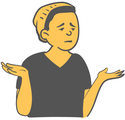


Please scroll down to read our Unconditional Education blog posts.
You can click the button below to learn more about our Unconditional Education and School Based Services!
|
During this period of prolonged school closures, we are all adapting to new realities of daily life in our own ways. We each have our own coping skills, routines (intentional or not), patterns that make up the rhythms of life. Without the physically, socially, and emotionally immersive experience of school and work, we add up new webs of behaviors, creating a new/abnormal sense of daily life that for most of us is completely novel.  And yet, there are myriad ways we collectively engage in routine, in social dynamics, in group narratives. And for young people everywhere, this social distancing has not eliminated the need to experiment and build a sense of identity. Adolescents and teens everywhere are still engaged in the process of differentiating their unique selves from their families, as they also spend more time at home with them and participate in family roles more regularly than before. I realized recently in a session with a client how much of a role mass media is playing in that process for youth right now.  While young people can’t meet together at school or in the community to participate in these exploratory behaviors with their peers, they are finding other spaces and creative mechanisms for continuing these critical developmental experiences. Whether it’s through video games, TV series, movies, music, manga, or other reading material, teens are using immersive virtual experiences to explore their concepts of self. I’ve spent a lot of time recently in sessions with young people engaging in a reflective process about what media they are consuming in order to support this. When a young person is telling me about a TV show they are watching, they are not simply relating a passive escapist activity, they are curating which aspects of the plot, characters, literary and artistic devices, and themes to share. They are piecing together parts of the deeper narratives, cultural and social values, and shared identity points with characters that they relate to and feel significant to them. This curational process of reflecting may look very different from being immersed in a group of peers, but the building of a sense of self continues. Initially I struggled to understand and recognize the significance of this in a therapeutic process, but as social distancing and remote services continue, I am seeing this with more clarity.  Witnessing a young person engage in that reflective process, learning which characters they relate to, admire, strive to be like, and feel an aversion to is all social-emotional learning. Who ever said there is nothing to be learned about ourselves from learning about vampires? Maybe it’s enriching to imagine ourselves outside the scope of standard human experiences, maybe it’s possible young people exploring their identities in this way will have extra creative thinking skills that will allow them to shape the future in ways we can’t even imagine. There’s no way for us to fully understand the range of impacts of this moment on young people’s social-emotional development. We already know many of the negative and disparate impacts on our communities across socioeconomic and racial lines. There is no living precedent for the suffering of this moment in time that we are collectively immersed in; we can acknowledge the incredible resilience of young people that is emerging through that suffering.
0 Comments
Leave a Reply. |
Authors:School Program Partnerships We're Hiring!Interested in joining our School Program Partnerships' Team? Check out our open positions below!
Categories:
All
Archives
May 2024
|